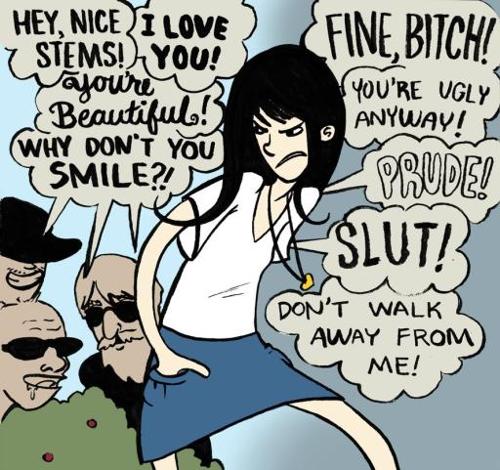Don’t Call Me Baby: The History of Catcalling

This is a guest post by TampaBayScene’s Ariel Chates.
Hey fellas, let me give you a pop quiz.
You see a woman walking down the street. What do you do?
- Scream “Hey baby” while proceeding to lick your lips
- Slow your car to a kidnap-friendly crawl and whistle as you drive by
- Block her path and say “Damn, beautiful.”
- Wait outside the pizza place she goes into, then say “I’ll be waiting outside your house later” as she walks out with a slice to go
The correct answer: None of the above. Do absolutely nothing. At the very most, admire silently and smile if her aesthetics please you.
Surprisingly (or not), choices A-D are inspired by my firsthand encounters. Not over the past few months or years, but within the past few days.
In what has become an endless cycle of outraged dialogue, I’ve spent an exhausting amount of time trying not to lash out at each and every man who feels entitled to comment on my body.

Via: Yahoo
This isn’t some thinly veiled attempt to cry and complain about the fact that men think I’m pretty, but hopefully it can be a wake-up call to all the guys out there who truly think they are complimenting me, my roommate or the young girl walking home from school in a skirt.
To the friend of mine who said, “Girls def hate it, but secretly it’s like recognition for being hot,” I hate to break it to you, but women don’t care about or need recognition from slimy men, or even men of the non-slimy variety.
Sure, we take pride in our clothes, makeup, workout routines, etc. – but we don’t do those things solely for male attention.
Catcalling dates back to as far as 200 B.C. though it was more commonly known as the “wolf whistle.” The term, which carries a predatory connotation, plays on the symbol of wolves as an example of male lust, which has been around since the Elizabethan era.
The term “catcaller” didn’t come around until the 1700s when theatergoers would whistle and jeer at the actors to express disapproval for the actions onstage. The term didn’t take on a sexual meaning until the 20th century, but the basic idea is the same: the catcaller’s right to vocally judge the victim. He’s an audience member expected to give feedback to a performance.
It’s a shame I even have to do this, but let me remind the men on the street: You aren’t watching a Broadway production of that young girl’s walk to work. This isn’t American Idol. She’s not trying out for whatever perverted fantasy is playing in your head.

Via: Storify
Studies show that 80 to 100 percent of women have been subjected to unwanted or harassing attention in public places from male strangers. I’d love to know what percentage of women have asked men to drop their pants after such interactions. I’m going to go ahead and assume that the answer is zero.
As one young woman wrote in her take on the matter: “Like most women I know, I treat street harassment like unpleasant weather – a common occurrence I silently endure by drawing my coat tighter around my body and walking briskly ahead with a stiff neck.”
This isn’t some hysterical, feminist cry for attention (as some men will surely think), but a real, everyday problem that has been accepted simply as an unfortunate part of life for too long.
Boys, don’t get too offended here.
Look no further than your closest magazine stand. I recently read an article in a women’s magazine outlining the different outfits to wear, split into categories based on the occasion and what a guy would like on you versus what a female friend would.
A Friday Night Out, for example illustrated the two camps’ choice outfits. Women, according to the magazine, would opt for black skinny jeans, cute pumps and a flowy floral top. Men, meanwhile, would prefer a little black dress and black heels.
How about this? I’ll dress however the hell I want and if a girl likes it, great! If a guy just so happens to like it, too, that’s just wonderful.
How are we supposed to tell young girls to dress for themselves if magazines are telling them how to dress for men?
It’s no secret to anyone that women’s bodies are oversexualized. There are thousands of articles, books and college seminars covering (no pun intended) our world’s obsession with boobs and asses, which are really just globs of extra fat, ya sickos.
Catcalling has become a part of society that is brushed off as boys being boys or women “asking for it.” In recent months, thankfully, women have been taking a stand against the unwanted attention of big mouthed men.
In New York City, “No Parking”-inspired signs have been popping up all over reading “No Catcalling Zone,” and “No Catcalling Any Time.”
Though these signs are being hailed as important street art, there is a much bigger message — yelling explicit things at women walking on the street should be held just as punishable as actually following through with your words.
You telling me you’ll be waiting outside my house later comes off not as a compliment, but a legitimate threat.

Via: The Philadelphia Inquirer
Argentina is on the right track, as well, putting into action legislation that would make catcalling a crime.
They would be the second Latin American country to do so, following Peru, which implemented similar legislation previously this year. Thousands of women marched in the streets protesting domestic violence and street harassment, but it might be a while until anything comes to fruition. As the Mayor of Buenos Aires publically stated, “Women who say they don’t like it [catcalling] and are offended by it, I don’t believe it.”
In my efforts to pinpoint the exact origins of catcalling, I came across an infuriating article by a man who felt it was “common sense” that yelling obscenities to women on the street should stop, but that criminalizing it or taking any real action would be “worse than doing nothing.” According to Conor Friedersdorf, the culture around street harassment will simply work itself out with time.
No, seriously, that’s his argument.
He believes the activists speaking out and spreading “awareness,” are doing a “public service and that with time as the cumulative effect of individual comments becomes more widely understood, some men will stop catcalling.”
Groundbreaking stuff here.
Another added bonus to this activism: “Other men will tell catcalling colleagues at the proverbial construction site, ‘Dude, that’s not cool.’ Slowly but surely, social norms will change.”
Yeah, because just waiting for change has worked so well in the past, right?
Fridersdorf misses the mark. Unfortunately, he is a carbon copy of a good chunk of the male population’s feelings on the matter. He notes that he rarely sees catcalling but understands how “burdensome” it can be for women especially when the words used are “crude, violent, or degrading.”
Herein lies the problem: Guys simply don’t understand that using baby names or “complimenting” me is just as burdensome as calling me a fat pig. Walking on the street doesn’t make me a prostitute. Wearing a tight dress or high heels does not mean I am soliciting you for comments.
Fridersdorf suggests “engaging them [catcallers] in conversation” to increase understanding or handing out cards with telephone numbers that ring to a PSA of sorts, all perfectly acceptable ideas that have been proven to be only mildly successful.

Via: Girl Empowered
His arguments against the idea of criminalizing catcalling are on the surface valid, but miss the core problem. He argues that it would “disproportionately result in the arrest of homeless men,” or that specifically in New York “men of color” would suffer at the hands of the “NYPD’s racial bias.” Sure, these statistics might come into play if catcalling were ever to be criminalized, but the main problem isn’t racial bias or lack of first amendment rights (which, somehow, is brought into the argument).
Sexual harassment just needs to stop.
I don’t care if you’re Latino, African-American, turquoise, polka dotted or green. If you run under the subway stairs to see under my dress, I would damn well hope you get a ticket.
A much stronger message has to be sent to those who engage in this act. I’m not talking jail time, but a $10 dollar fine would do the job. Call it the city wide swear jar, whatever, but society needs something to get people to think before they open their mouths.
I live in New York City, so I witness unwanted interactions on a regular basis, but watching teenage boys take pictures of a girl running by in workout clothes is most definitely not the same as “panhandlers asking for change” or “canvassers requesting a moment for the environment.”
As we’ve been able to see with other feminist causes, when the politicians and police don’t step in, women have been taking it upon themselves to showcase catcalling for the disgusting habit it truly is.
Many women have uploaded videos of themselves walking around cities and the (sometimes frightening) confrontations with the men whistling and “flirting” with them.
In the majority of scenarios when the woman speaks up, the man is taken aback. In others, the men turn angry, one bolding claiming women were put on this earth for men to admire, and he’ll preach and whistle about our boobs as much as he wants, goddammit.
The anger reaction, though not as common in the videos I’ve seen, is likely the reason catcalling has been met with relatively little resistance for so long.
It’s the threat of violence.
We’ve all seen it in on a TV show or another: man meets woman, man flirts with woman, woman rejects… and is killed.
Sure, in broad daylight I might roll my eyes at your whistle, but if you’re walking past me at night, chances are I’m not going to tell you to back off even though you most definitely should.
It’s a vicious cycle, and without the intervening of law enforcement or legislation, it’s a tricky issue to combat.
The one thing we can do right now without long letters to the Senate or petitions to local police stations (though that should be done too) is to educate. Let your male friends and relatives know their commentary is unwelcome. Tell your students. Pass out fliers around college campuses. Whatever.
Thinking a woman is beautiful and being aggressive with your thoughts are two very different situations.
Us women are, as my friend Joe rightfully said, “embarrassed for the men doing the catcalling.”
So, guys, unless I morph into a tiny, fleshy, impossibly adorable infant, don’t call me baby.
Featured image courtesy of: Medium






